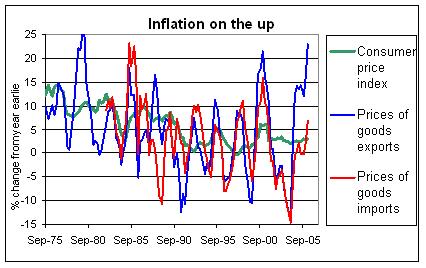Australia is firmly in the US camp in both geo-political and economic terms, with an unsustainable current account deficit despite the benefits for us of the world’s greatest commodities boom.
It is fashionable, especially it seems in Canberra, to believe these imbalances do not matter. They reflect, it is said, the decisions of consenting adults in the private sector to spend more than they earn: all will be well since the government is saving more than it spends. But, as the global gurus of the IMF point out, adjusting to imbalances is often chaotic and damaging and, in the case of China and the US, the damaging chaos could include very damaging trade embargoes as the US cuts it’s spending and its unbalanced trade with China.
House prices have risen faster in Australia than in most countries. This has occurred with the help of accommodating tax law and has been buttressed by a vast expansion of household debt. The debt burden has stayed the Reserve Bank’s naturally propensity to limit the size of the asset boom, and now limits its ability to lean into all the imbalances for fear of precipitating an unnecessary recession.
Advertisement
The imbalance of most direct interest to the Reserve is inflation. Here the graph tells the story. Unusually low global inflation has begun to rise. The rise of export prices is well understood, influenced as it is by the commodity prices that have raised our individual and collective incomes so much. Far more worrying is the rise of import price inflation. And then there is the rise of goods and services inflation.
The CPI rose by 0.9 per cent in the March quarter, slightly above the market consensus of 0.8 per cent. The headline inflation rate rose to 3.0 per cent from 2.8 per cent in Q4. More importantly for the monetary-policy outlook, the RBA's measures of “core inflation” suggest acceleration in trend inflation, after a period of remarkable stability near 2.5 per cent. These measures do not yet reflect record oil prices in April or the continuing impact of the global commodity boom.
The Reserve is on the horns of a dilemma it cannot avoid. It should do its bit to minimise the imbalances but with the build-up of household debt it is wary of the impact of policy tightening. Soon it will have no choice but to act and then we shall find out just how fragile is our current prosperity.

Source: RBA and ASB
Addendum to version published in The Australian
Monetary policy is not the main game at present, nor do I believe it will be greatly influenced by the Federal budget.
This month I have deliberately focused on the main game which is the state of the global economy. Continuing strong growth and the legacy of easy money is sure eventually to produce what I call "goods and services inflation", having already produced dangerous levels of asset inflation.
Advertisement
It would have been better if Australia had tightened its monetary policy sooner and by more, as I have argued consistently during this massive asset boom. (And we could also have argued in relevant economic fora - and perhaps we did - for tighter global monetary policy.) "Better late than never" remains my view about local monetary policy, but there are many tactical issues for the RBA to consider, not least the May budget, not wanting to rock the boat ahead of the appointment of the next RBA governor and the usual uncertainties about the actual economic trajectory.
I see a rate hike this month finely balanced on tactical grounds, although there are so many stories from "well connected" journalists and financial sector economists that I am tempted to say "the fix is on".
I leave this sort of prediction to those with more vivid imaginations than Henry, or a far greater ability to listen at drainpipes or to learn in cosy boardroom chats. Instead this month I focus on geopolitical risks - the war on terror - plus what I might call "geo-economic" risks - the deteriorating environment and the growing disparity of wealth and incomes both within countries and between nations: this development feeding the geopolitical tensions in obvious ways. There are also the obvious economic "imbalances" so beloved of serious analysts, the US (and Australian) current account deficits, China's burgeoning current account surpluses, over-stimulated asset markets and surging commodity prices.
Taken together, these big issues have a high chance of bringing the current global boom to a juddering halt.
That is the big economic issue we face, and to maximise our chances of coping in good shape we need to become far more competitive than we are at present. The current IR reforms are, I believe, biting far harder than currently discussed and this will be helpful. The start of serious tax reform argued for in this column last month would also be very helpful. IR and tax reform are the two big reforms that could help Australia to maintain its "miracle economy" status through the virtually inevitable global economic downturn.
Discuss in our Forums
See what other readers are saying about this article!
Click here to read & post comments.
16 posts so far.